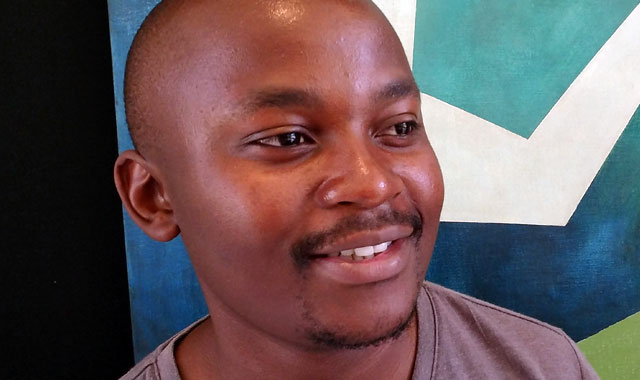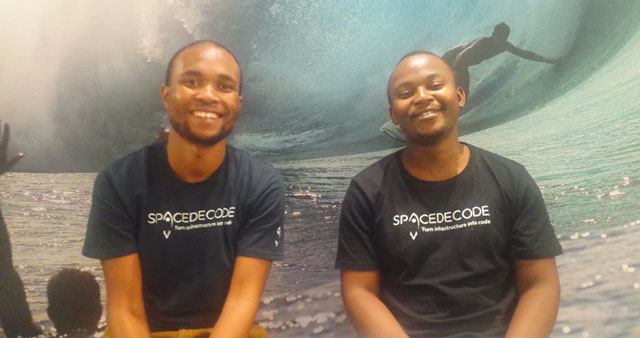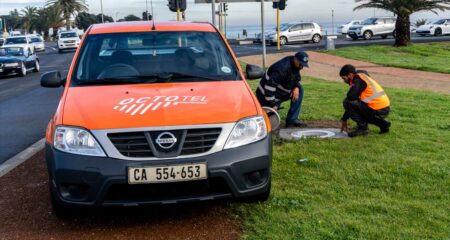
A technology start-up created by two youngsters, one from Tembisa, near Johannesburg, and the other from rural KwaZulu-Natal, has started making waves with their self-developed “productivity engine” after raising early-stage funding from Cape Town Internet service provider RSAWeb.
Spacedecode, founded by Nkosana Mabuza, 30, and Sithembiso Khumalo, 26, who met at university, are now poised to establish a presence in the US and are looking for partners to take the company’s product, called EngineOne, to markets across Africa.
EngineOne brings team members together, both technical and non-technical, to collaborate efficiently towards the same goal. “We have brought code management and project management together,” Mabuza told TechCentral in an interview in Johannesburg on Thursday.
Mabuza and Khumalo met in 2007, when they both studied information science at the University of Pretoria.
Mabuza was part of Dimension Data’s Saturday School programme in high school. It was at the Saturday School that he touched a computer for the first time, in grade 11. He matriculated from Tembisa’s Ingqayizivele High School.
Khumalo, a largely self-taught software engineer who matriculated from Hlubi High School in deep rural KwaZulu-Natal (between Dundee and Ulundi), had his first interaction with a computer in his first year at university. Yet he’s taken to software engineering like a duck to water, Mabuza said.
The pair, who became friends, graduated in 2010 and then went their separate ways, but stayed in touch online.
Mabuza joined Accenture as a business analyst, where he helped plan and design the company’s lead management system, which it’s still using today. He also built a business intelligence system for its sales department.
Khumalo, meanwhile, went to work for a small software development house as a software engineer.
The pair met again in 2013, after Mabuza founded his first business, called Exponentia, as a part-time project while still at Accenture. He needed a website built and asked Khumalo to do it for him. “I liked what he was doing and he liked what I was doing, so we decided to work together.”
They founded a company called Lepsta, which built software called Black Hole, which businesses could use as a service platform. “The idea was to allow software developers to focus only on building the front-end, and they sent their data to our [application programming interface], and Black Hole would develop the back-end on the fly. We made a lot of mistakes and eventually our resources were exhausted.”
At the end of 2013, they realised they needed to build something quickly to sustain them. “Spacedecode was born. It was meant to be a week-long project, but it’s turned into something great.”
In 2014, the pair quit their jobs, took all their savings — about R200 000 at the time — and started focusing Spacedecode full time, moving into a house together.
They hit a lucky break in 2014 after entering a competition called Sparkup, by Net Prophet, at which they pitched their idea to potential investors. They had no money to their name, with their trip to Cape Town sponsored by Derrick Kotze, CEO of mLab Southern Africa, who was excited about the pair’s potential.
“We had R30 to our name and we had to spend four days in Cape Town. Somehow we came back with R10 change!”
One of the Sparkup judges was RSAWeb CEO Rob Gilmour, who liked their pitch. Gilmour invited them to the RSAWeb offices in Sea Point to meet with the team, including chief technology officer Mark Slingsby.
“We carried computer boxes to the meeting because we didn’t even have laptops. We pitched to them and they were sold. They asked what it would take for us to move to Cape Town,” Mabuza said.

“A week later, still completely broke, we went to the airport without tickets to try to get to our funding meeting with Rob and Mark, which was later the same day, at 2.30pm. We had to close the investment. Around 12pm, after trying to reach Derrick all morning, he picked up his phone. He said we were two brave men for going to the airport without tickets.”
The pair made the meeting with Gilmour and Slingsby.
RSAWeb agreed to give them three weeks to turn their concept into a rudimentary product. “They invested, and we moved to Cape Town in June 2015.”
Things have been moving quickly since then. The business has pivoted after the team realised that developers were required to change their processes completely. That was a huge barrier, and it led to the development of EngineOne.
The revenue model is based on a per-user subscription, though the software is free until January 2017. Even after that date, the software will stay free for small teams, Mabuza said.
“It combines code management and project management in one platform to allow companies to have a single point of interaction on software development projects. EngineOne unites teams.”
The cloud-based software has attracted considerable interest from businesses in Mozambique, where a partner has been selling it.
It is also attracting interest from US businesses. Mabuza and Khumalo believe the US will quickly become their most important market. At the time of writing, Khumalo was in Washington, DC investigating opening an office. Spacedecode will decide on its plans for the US soon.
Raising additional funding is a key focus. “This will allow us to hire more developers and help us accelerate the development of more features,” Mabuza said. “We are also looking for partners to help us accelerate penetration into more African markets.” — © 2016 NewsCentral Media




